
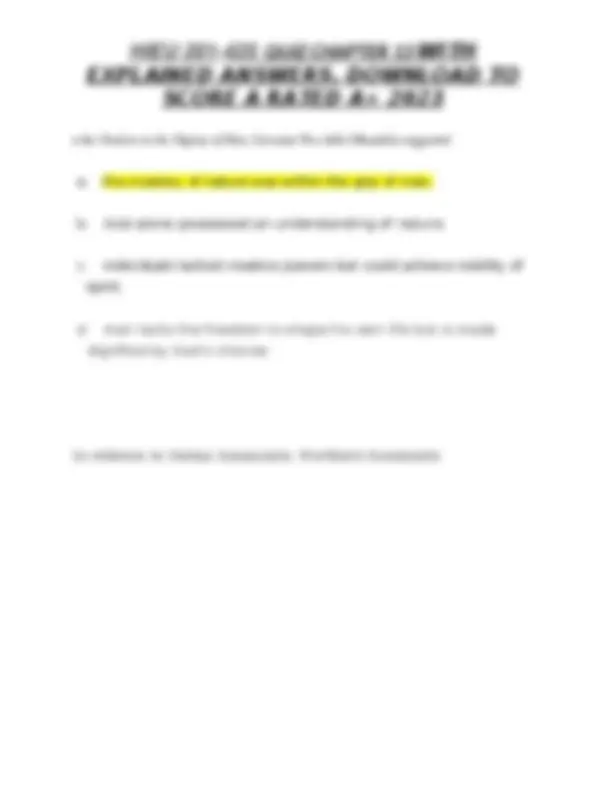
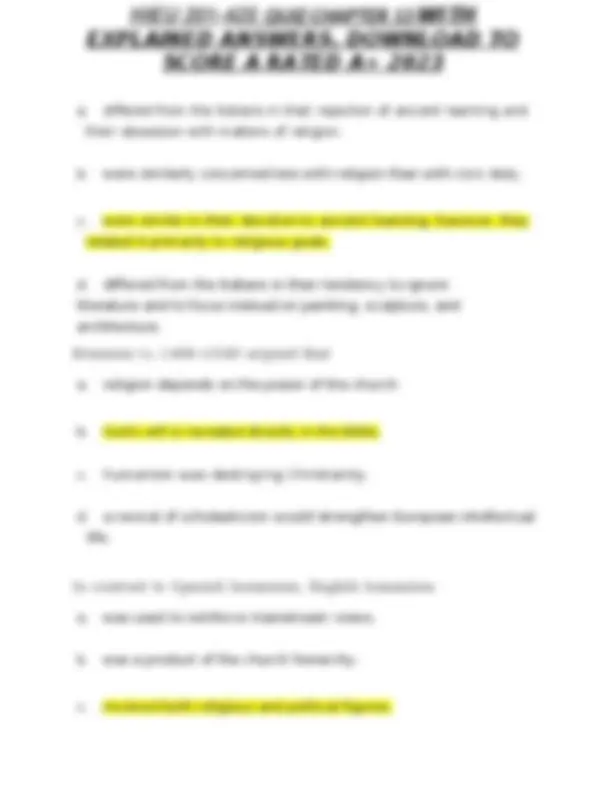
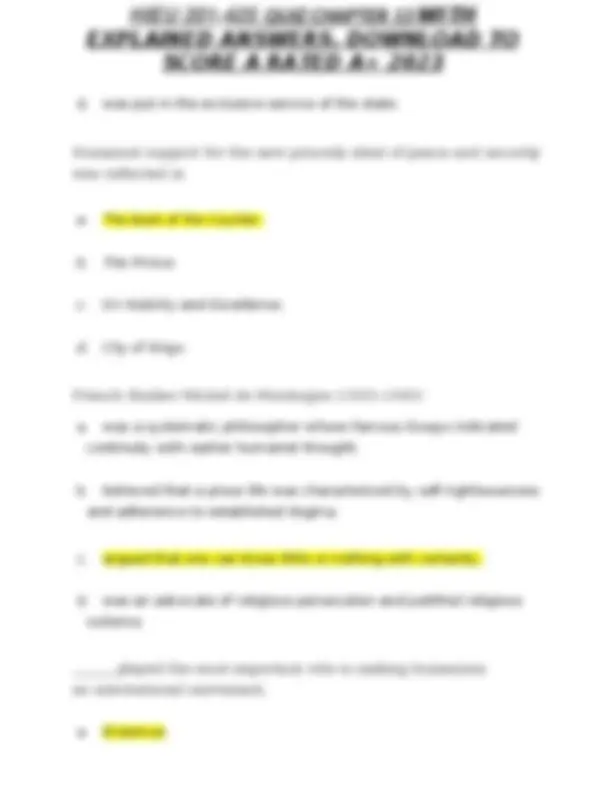
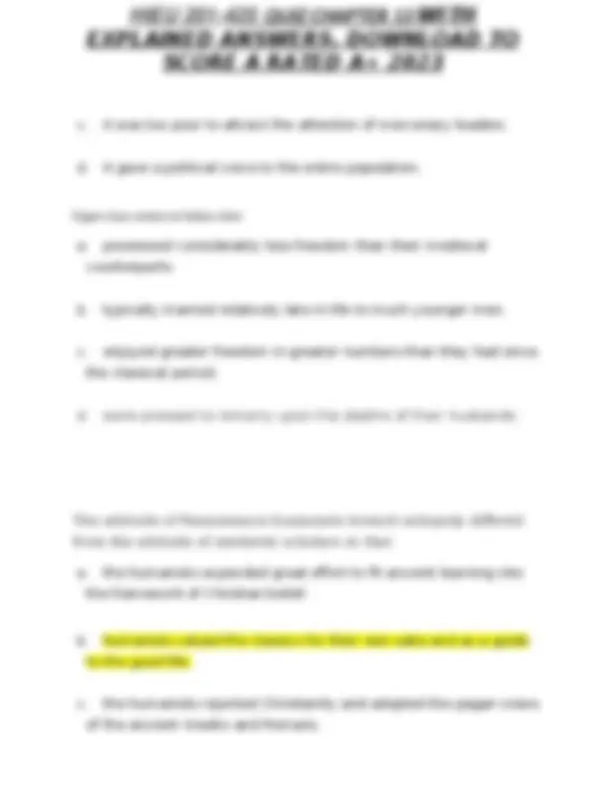
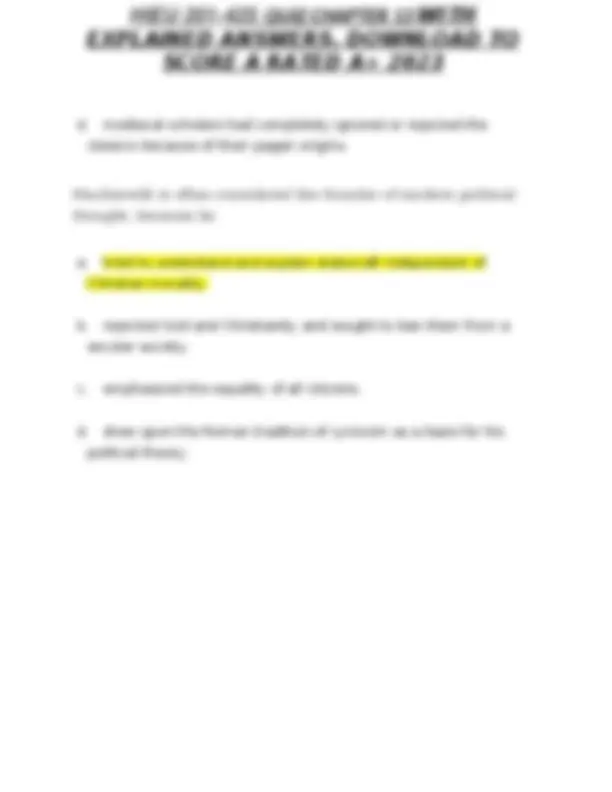
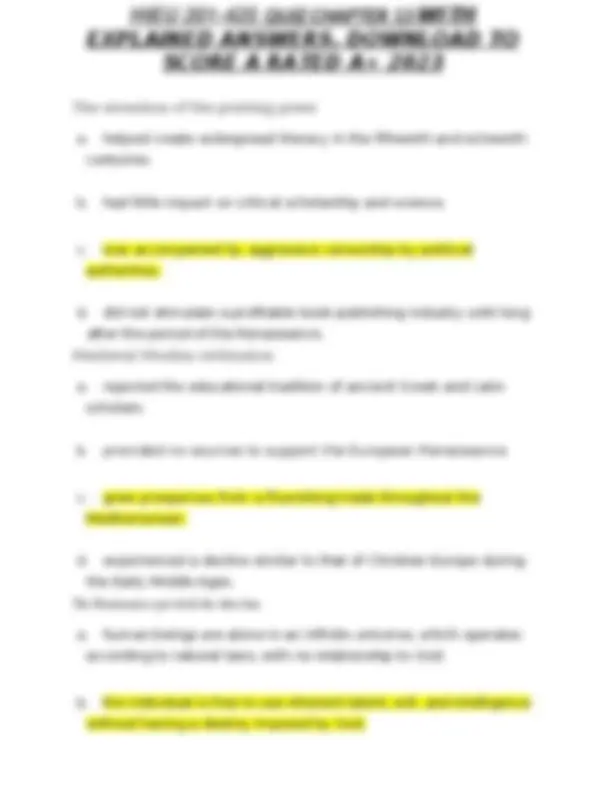


Study with the several resources on Docsity

Earn points by helping other students or get them with a premium plan


Prepare for your exams
Study with the several resources on Docsity

Earn points to download
Earn points by helping other students or get them with a premium plan
Community
Ask the community for help and clear up your study doubts
Discover the best universities in your country according to Docsity users
Free resources
Download our free guides on studying techniques, anxiety management strategies, and thesis advice from Docsity tutors
HIEU 201-425 QUIZ CHAPTER 13 WITH EXPLAINED ANSWERS. DOWNLOAD TO SCORE A RATED A+ 2023
Typology: Quizzes
1 / 11

This page cannot be seen from the preview
Don't miss anything!







EH Quiz Ch 13 The city-states of northern Italy differed from most of Europe because in the Italian city-states a. the feudal nobility played a much more important role in government than elsewhere in Europe. b. no guilds or corporate institutions developed. c. the feudal nobility refused to form alliances with urban elites. d. commercial activity flourished due to a monopoly of trade in Mediterranean areas. The republicanism of the city-states proved precarious for all of the following reasons EXCEPT a. the natural disasters of the period from 1350 to 1450 encouraged the drift towards despotism. b. the city-states had come to rely on mercenaries to fight their wars. c. there was no tradition of republicanism in the region and, therefore, its roots were never very deep.
d. conflict between nobles and merchants led one group, or both, to turn to one-man rule The chivalric code that had expressed social values in the Middle Ages was changed in the Renaissance so that a. birth now counted more than wealth or landholding in defining a person's social status. b. military virtues and honor were no longer important in one's life. c. ambition and achievement, especially in politics, business, and art, were recognized as components of honor. d. the society was no longer elitist or aristocratic, but rather egalitarian and democratic. Which of the following wrote texts that challenged traditional views of female potential? a. Heinrich Cornelius Agrippa von Nettesheim b. Christine de Pizan c. Moderata Fonte d. all of the above
a. differed from the Italians in their rejection of ancient learning and their obsession with matters of religion. b. were similarly concerned less with religion than with civic duty. c. were similar in their devotion to ancient learning; however, they related it primarily to religious goals. d. differed from the Italians in their tendency to ignore literature and to focus instead on painting, sculpture, and architecture. Erasmus (c. 1466–1536) argued that a. religion depends on the power of the church b. God's will is revealed directly in the Bible. c. humanism was destroying Christianity. d. a revival of scholasticism would strengthen European intellectual life. In contrast to Spanish humanism, English humanism a. was used to reinforce mainstream views. b. was a product of the church hierarchy. c. involved both religious and political figures.
d. was put in the exclusive service of the state. Humanist support for the new princely ideal of peace and security was reflected in a. The Book of the Courtier. b. The Prince. c. On Nobility and Excellence. d. City of Kings. French thinker Michel de Montaigne (1533–1592) a. was a systematic philosopher whose famous Essays indicated continuity with earlier humanist thought. b. believed that a pious life was characterized by self-righteousness and adherence to established dogma. c. argued that one can know little or nothing with certainty. d. was an advocate of religious persecution and justified religious violence played the most important role in making humanism an international movement. a. Erasmus
A major reason why the Renaissance began in northern Italy was the a. region's stable political situation, under the firm control and protection of the Holy Roman emperor. b. region's surplus of wealth, to support learning, culture, and the arts. c. region's lack of a previous cultural tradition, which led inhabitants to seek to overcome this relative inferiority. d. desire of the papacy, which controlled this area, to encourage the arts as a means of glorifying God The Peace of Lodi, concluded in 1454, involved all of the following EXCEPT a. the Papal States. b. Florence. c. the kingdom of Naples and Sicily. d. France. Venice was able to maintain republican government longer than other cities because a. elites largely withdrew from government. b. it had a strong republican constitution.
c. it was too poor to attract the attention of mercenary leaders. d. it gave a political voice to the entire population. Upper-class women in Italian cities a. possessed considerably less freedom than their medieval counterparts. b. typically married relatively late in life to much younger men. c. enjoyed greater freedom in greater numbers than they had since the classical period. d. were pressed to remarry upon the deaths of their husbands. The attitude of Renaissance humanists toward antiquity differed from the attitude of medieval scholars in that a. the humanists expended great effort to fit ancient learning into the framework of Christian belief. b. humanists valued the classics for their own sake and as a guide to the good life. c. the humanists rejected Christianity and adopted the pagan views of the ancient Greeks and Romans.
The invention of the printing press a. helped create widespread literacy in the fifteenth and sixteenth centuries. b. had little impact on critical scholarship and science. c. was accompanied by aggressive censorship by political authorities. d. did not stimulate a profitable book-publishing industry until long after the period of the Renaissance. Medieval Muslim civilization a. rejected the educational tradition of ancient Greek and Latin scholars. b. provided no sources to support the European Renaissance. c. grew prosperous from a flourishing trade throughout the Mediterranean. d. experienced a decline similar to that of Christian Europe during the Early Middle Ages. The Renaissance put forth the idea that a. human beings are alone in an infinite universe, which operates according to natural laws, with no relationship to God. b. the individual is free to use inherent talent, will, and intelligence without having a destiny imposed by God.
c. knowledge and understanding can be gained only by the complete rejection of the past. d. one should be realistic about the way the world is and not waste foolish efforts on trying to improve it.